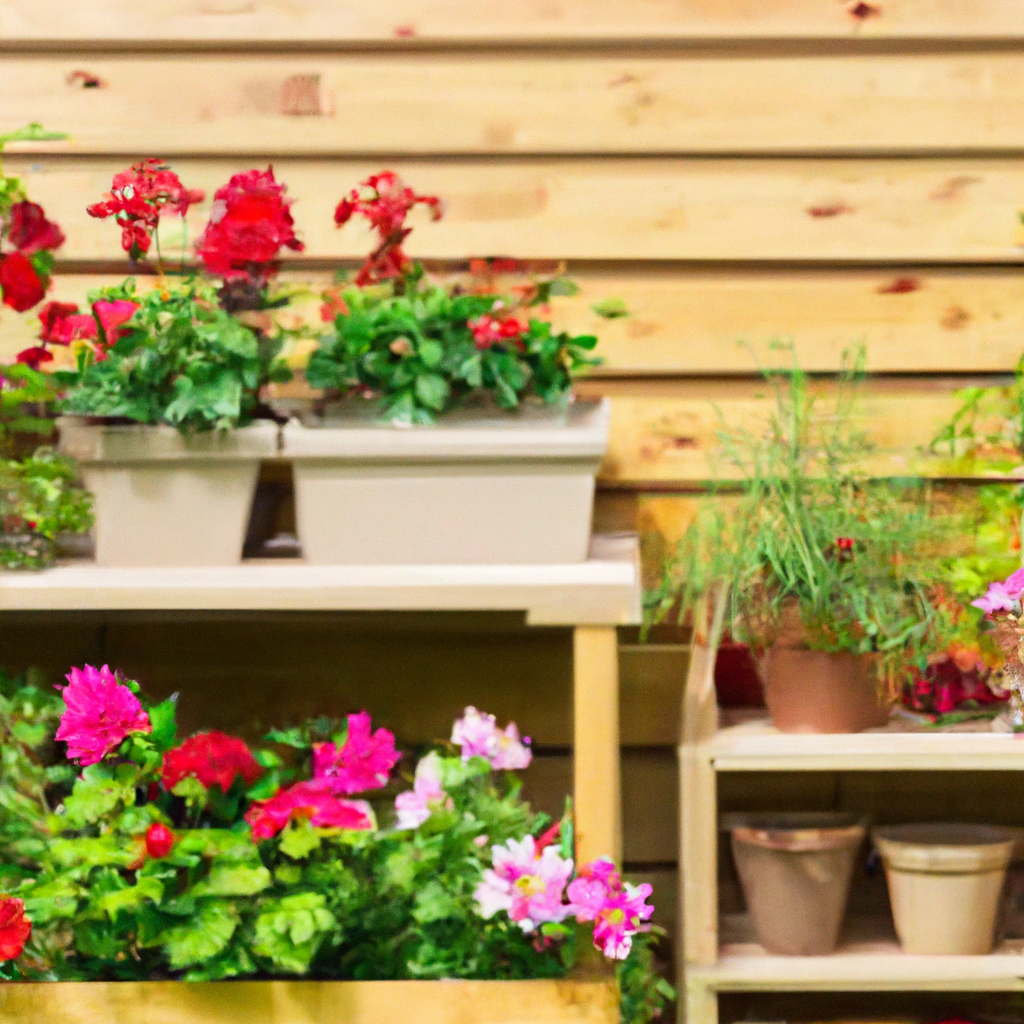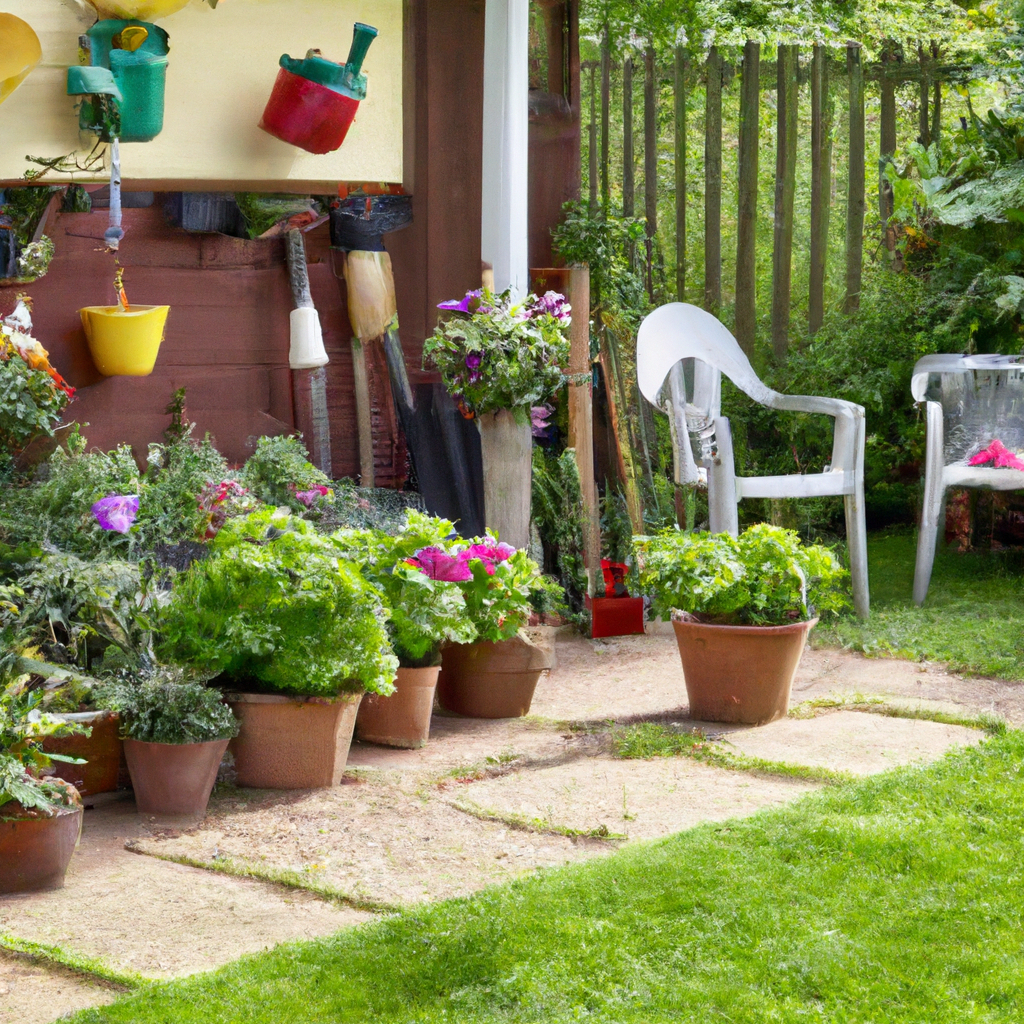
Are you eager to start your own container gardening business but not sure where to begin? Look no further! In this article, we will provide you with expert tips and advice on how to kickstart a successful container gardening business. From choosing the right plants and containers, to marketing and selling your products, we’ve got you covered. So grab your gardening gloves and get ready to grow your business!

Choose a Niche
If you’re considering starting a container gardening business, the first step is to choose a niche. Container gardening offers a variety of options for different plants, styles, and purposes. You can narrow down your target market by focusing on a specific niche, such as indoor container gardening, edible container gardening, or vertical gardening.
Identify a target market
To successfully establish your container gardening business, it’s important to identify your target market. Who are your potential customers and what are their preferences? Are you targeting urban dwellers with limited outdoor space, or maybe retirees who enjoy gardening as a hobby? Understanding your target market will help you tailor your product offerings and marketing strategies to attract the right customers.
Research popular container garden options
Before finalizing your niche, do some research on popular container garden options. Find out which plants, styles, and designs are currently in demand. Take note of any unique and innovative container gardening ideas that could set your business apart from the competition. By keeping up with the latest trends, you can cater to the preferences of your target market and stay ahead in the container gardening industry.
Develop a Business Plan
Once you have chosen your niche, it’s time to develop a comprehensive business plan. A well-thought-out business plan will serve as a roadmap for your container gardening business and help you stay focused on achieving your goals.
Define your vision and goals
Start by defining your vision for the business. What is the purpose of your container gardening business? What do you hope to achieve in the long term? By clearly defining your vision and setting specific goals, you can stay motivated and make informed decisions that align with your overall vision.
Analyze your competition
Conduct a thorough analysis of your competition to understand their strengths and weaknesses. Identify what sets you apart from your competitors and how you can offer unique value to your customers. This analysis will help you identify opportunities for growth and come up with strategies to differentiate your container gardening business.
Determine your pricing strategy
Decide on a pricing strategy that is competitive yet profitable. Consider the cost of purchasing plants, containers, and other supplies, as well as any additional services you plan to offer. Factor in your overhead costs, such as rent, utilities, and marketing expenses. Pricing your products and services appropriately will ensure you can cover your expenses while still offering value to your customers.
Outline your marketing plan
Your marketing plan will play a crucial role in attracting customers to your container gardening business. Define your target market and identify the most effective channels to reach them. Consider using online platforms, such as social media and a dedicated website, to showcase your products and services. Develop a content strategy that engages your audience and highlights the benefits of container gardening.
Create a budget
Create a budget for your container gardening business to track your expenses and ensure financial sustainability. Include projected revenue, operating costs, and any additional investments required. Having a budget in place will help you make informed financial decisions and ensure that you are profitable in the long term.

Obtain Necessary Licenses and Permits
Before starting your container gardening business, it’s essential to research and obtain any necessary licenses and permits. Compliance with local regulations ensures that you operate legally and avoid any potential fines or penalties.
Research local regulations
Research the specific licenses and permits required for operating a container gardening business in your area. Contact your local government or licensing authorities to obtain detailed information. Some common permits may include a business license, a vendor’s license, or a nursery license. Make sure you understand the regulations and meet all the requirements before proceeding with your business.
Apply for required licenses and permits
Once you have identified the necessary licenses and permits, complete the application process. Provide all the required documentation, pay any applicable fees, and follow any guidelines or regulations provided by the licensing authorities. It’s important to ensure that you have all the necessary permits in place before starting your container gardening operations.
Source High-Quality Plants and Containers
To provide your customers with the best container gardening experience, it’s crucial to source high-quality plants and containers. Building relationships with reliable suppliers will enable you to offer healthy and vibrant plants to your customers.
Find reliable plant suppliers
Search for reputable plant suppliers in your area or consider partnering with local nurseries. Look for suppliers who offer a wide variety of plants to meet the preferences of your target market. Consider the quality of their plants, their ability to provide consistent supply, and their reputation in the industry. Establishing strong relationships with reliable suppliers will ensure that you can consistently offer top-notch products to your customers.
Choose containers that are suitable for different plants
Selecting the right containers for your plants is equally important. Consider the specific needs of different plants and choose containers that provide adequate space, drainage, and stability. Different plants have different root systems and growth habits, so it’s important to match them with suitable containers. Offer a range of container options, including different sizes, materials, and designs, to cater to the preferences of your customers.

Select the Right Location
Choosing the right location for your container gardening business is crucial for its success. Consider factors such as space requirements, accessibility, and availability of sunlight and water sources.
Consider space requirements
Evaluate your space requirements based on the scale of your container gardening business. Determine how much space you need to accommodate your plants, containers, and any additional equipment or displays. If you plan to operate from a physical location, ensure it has enough room to comfortably display and organize your products.
Ensure access to sunlight and water sources
Container plants require access to sunlight and sufficient water sources for their growth and survival. When choosing a location, ensure that it offers ample sunlight for your plants. If natural sunlight is limited, consider supplemental lighting options. Similarly, make sure that your location has access to water sources for watering your plants. Consider the availability of water connections and the ease of irrigation systems if necessary.
Build an Attractive Display
Creating an attractive display is key to attracting customers and showcasing the beauty of container gardening. Focus on designing an eye-catching setup and arranging your plants in an appealing way.
Design an eye-catching setup
Design your container gardening display in a way that grabs attention and creates a welcoming atmosphere. Consider using visually appealing elements such as colorful displays, unique containers, and creative signage. Arrange your plants in a way that showcases their beauty and highlights the variety of options available. Pay attention to aesthetics and create a visually pleasing environment that entices customers to explore your offerings.
Arrange plants in an appealing way
The way you arrange your plants can significantly impact the visual appeal of your container gardening display. Consider creating a balanced and harmonious arrangement by mixing different plant heights, textures, and colors. Group plants with similar water and light requirements. Experiment with different arrangements and seek feedback from others to ensure that your display is visually appealing and showcases the full potential of container gardening.

Focus on Plant Care
Providing proper care for your plants is essential to maintain their health and attractiveness. By implementing effective plant care techniques, you can ensure that your customers receive high-quality plants that thrive in their containers.
Learn proper watering techniques
Watering is a critical aspect of plant care. Different plants have varying water requirements, so it’s important to learn the proper watering techniques for each type of plant you offer. Overwatering or underwatering can lead to plant stress, disease, or even death. Monitor soil moisture levels and adjust your watering schedule accordingly. Educate your customers about proper watering techniques to help them maintain their container gardens successfully.
Implement pest control measures
Pests can damage plants and compromise their health and appearance. Implement effective pest control measures to minimize the risk of infestations. Regularly inspect your plants for signs of pests and take action at the first sight of any issues. Avoid using harsh chemicals that can harm the environment or your customers’ health. Explore organic pest control options and educate yourself on natural remedies and preventive measures to ensure the well-being of your plants.
Understand fertilization schedules
Proper fertilization is crucial for providing essential nutrients to your plants. Different plants have different nutritional requirements, so it’s important to understand their specific needs. Develop a fertilization schedule that takes into account the type of plants you offer and their growth stages. Consider organic fertilizers that are environmentally friendly and safe for plants, customers, and pets. Educate your customers about the importance of fertilization and provide guidance on appropriate fertilization practices for their container gardens.
Offer Additional Services
To differentiate your container gardening business and enhance customer satisfaction, consider offering additional services that complement your core offerings.
Provide landscape design advice
Offering landscape design advice can help customers make the most of their container gardens. Provide guidance on plant selection, container placement, and overall design principles. Offer personalized consultations or workshops where you can share your expertise and provide tailored recommendations based on individual customer preferences and space limitations. By helping your customers create aesthetically pleasing and functional container gardens, you can establish yourself as a trusted resource in the industry.
Offer maintenance services
Many customers may not have the time or expertise to properly maintain their container gardens. By offering maintenance services, you can provide ongoing care for their plants and containers. Offer services such as watering, fertilization, pruning, and pest control on a scheduled basis. This additional service will not only provide convenience to your customers but also generate recurring revenue for your container gardening business.

Market Your Business
To attract customers and build brand awareness, it’s crucial to develop a strong marketing strategy for your container gardening business. Utilize various marketing channels to promote your products and services to your target market.
Create an engaging website
A well-designed website is essential for showcasing your container gardening business and attracting potential customers. Include high-quality photos of your plants and containers, detailed product descriptions, and information about your additional services. Optimize your website for search engines to improve your visibility online. Incorporate a blog section where you can share gardening tips, tricks, and success stories to engage your audience and establish yourself as a knowledgeable expert.
Utilize social media platforms
Social media platforms provide valuable opportunities for connecting with your target audience and growing your container gardening business. Create engaging social media profiles on platforms such as Facebook, Instagram, and Pinterest. Share visually appealing images of your container gardens, provide gardening tips, and interact with your followers. Collaborate with influencers or garden-related accounts to expand your reach and attract followers who are interested in container gardening.
Participate in local events or farmers markets
Participating in local events or farmers markets can help you reach a wider audience and generate buzz for your container gardening business. Set up a booth or display that showcases your products and services. Offer live demonstrations or workshops to attract potential customers and educate them about the benefits of container gardening. Connect with other local businesses or organizations to explore collaboration opportunities that can further promote your brand.
Provide Excellent Customer Service
Providing excellent customer service is crucial for building positive relationships with your customers and ensuring their satisfaction with your container gardening business.
Be knowledgeable and helpful
As the face of your container gardening business, it’s important to be knowledgeable and helpful to your customers. Take the time to educate yourself about different plant species, container options, and gardening techniques. Stay updated on the latest trends and best practices in container gardening. Be approachable and ready to answer any questions or concerns that your customers may have. By demonstrating expertise and providing valuable advice, you can build trust and loyalty among your customer base.
Respond promptly to customer inquiries
Promptly responding to customer inquiries is essential for maintaining good customer relationships. Whether it’s answering questions via email, phone calls, or social media, strive to provide timely and helpful responses. Show your customers that you value their interest and are dedicated to meeting their needs. Timely communication not only enhances customer satisfaction but also reflects professionalism and reliability.
Follow up with satisfied customers
Following up with satisfied customers is an effective way to build customer loyalty and generate positive reviews and referrals. Send a personalized thank-you note or email after a purchase or service engagement. Ask for customer feedback and encourage them to share their experience with others. Offer loyalty programs or discounts for repeat customers to show your appreciation. By nurturing relationships with your satisfied customers, you can create a strong customer base and generate positive word-of-mouth for your container gardening business.
Starting a container gardening business requires careful planning and attention to detail. By choosing the right niche, developing a comprehensive business plan, obtaining the necessary licenses, sourcing high-quality plants and containers, selecting the right location, building an attractive display, focusing on plant care, offering additional services, marketing your business, and providing excellent customer service, you can establish a successful container gardening business. With hard work, passion for plants, and dedication to customer satisfaction, your container gardening business can thrive in the growing market of urban and hobby gardening.







